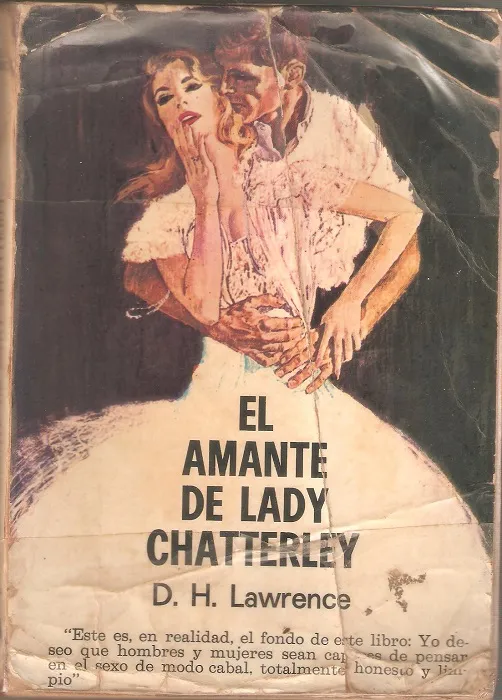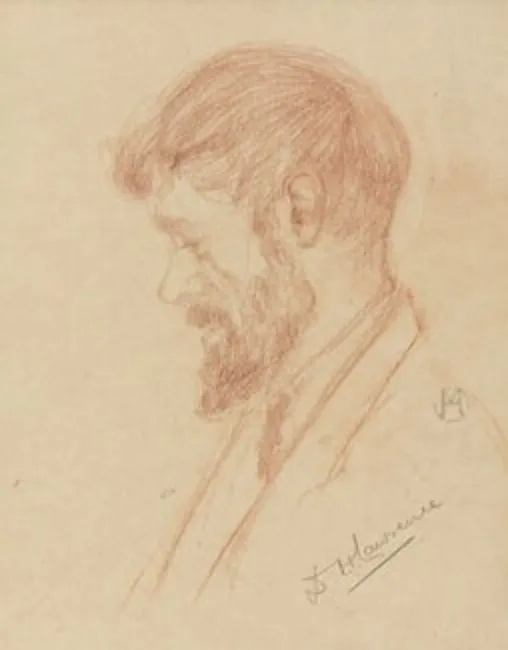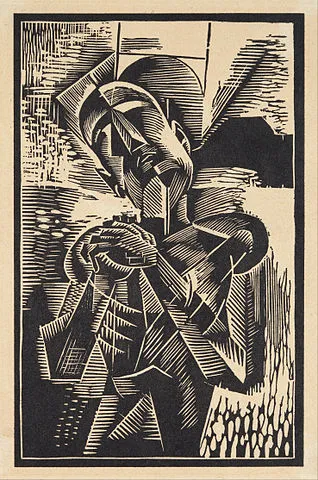En mis inicios a la lectura de textos literarios relacionados con la sexualidad ocupó uno de los primeros lugares la novela de D.H. Lawrence (así se identificaba), El amante de Lady Chatterley. Esa novela escrita en 1928, estuvo prohibida hasta 1960 en el Reino Unido. Seguramente muchos de lo que me leen ahora no la conocerán, mas, si les interesa ese tipo de literatura, deberían buscarla. Existen versiones fílmicas; la que conozco y podría recomendar es una realización francesa de Pascal Ferran hecha en 2007 (ver referencia).
***
In my bginnings to the reading of literary texts related to sexuality, one of the first places was occupied by the novel by D.H. Lawrence (that's how he identified himself), Lady Chatterley's Lover. That novel, written in 1928, was banned until 1960 in the UK. Surely many of you who read me now will not know it, but, if you are interested in that kind of literature, you should look for it. There are film versions; the one I know and could recommend is a French production by Pascal Ferran made in 2007 (see reference).

Ese primer contacto con David Herbert Lawence se convirtió, posteriormente, en una relación más prolongada aunque distendida. Sus novelas Mujeres enamoradas y La serpiente emplumada, y más tarde el descubrimiento de su poesía –gracias a la edición de una antología hecha por la Universidad de los Andes (Venezuela)–, me reconfiguró mi visión de él; y posteriormente el acceso a sus poemas-pensamientos, traducidos por el poeta venezolano Rafael Cadenas, amplió definitivamente mi apreciación y acercamiento a Lawrence ( a ellos me referiré).
That first contact with David Herbert Lawence became, later on, a more prolonged but distended relationship. His novels *Women in Love and The Feathered Serpent, and later the discovery of his poetry -thanks to the edition of an anthology made by the University of the Andes (Venezuela)-, reconfigured my vision of him; and later the access to his poems-thoughts, translated by the Venezuelan poet Rafael Cadenas, definitely broadened my appreciation and approach to Lawrence (I will refer to them).

D.H. Lawrence (quien nació el 11 de septiembre de 1885 en Eastwood, Inglaterra) es uno de los principales escritores ingleses de la primera mitad del siglo XX, junto a Aldous Huxley, quien fuera su amigo, autor de esa novela esencial de la ciencia-ficción: Un mundo feliz.
Su actitud liberal, atrevida para su época, lo hizo víctima de la censura y la persecución policial incluso. Eso lo presionó a tener una vida de viajes y estancia en diferentes países; un exilio impuesto, llamado por él "peregrinación salvaje". Así pudo conocer no solo otros países de Europa, sino también de Asia, y luego de América, particularmente Estados Unidos y México; este último tuvo una significación especial para él (he allí su novela Serpiente emplumada), hasta comprar un rancho en ese país, que aún existe, según se sabe.
D.H. Lawrence (who was born on September 11, 1885 in Eastwood, England) is one of the main English writers of the first half of the 20th century, together with Aldous Huxley, who was his friend, author of that essential novel of science fiction A Brave New World.
His liberal attitude, daring for his time, made him a victim of censorship and even police persecution. That pressured him to have a life of travel and stay in different countries; an imposed exile, called by him "wild pilgrimage". Thus he was able to know not only other countries in Europe, but also in Asia, and then in America, particularly the United States and Mexico; the latter had a special significance for him (see his novel Feathered Serpent), until he bought a ranch in that country, which still exists, as it is known.
Bohumil Kubišta (1884–1918) - Fuente - Dominio público | Public Domain
Sin ser un especialista en la obra de D.H. Lawrence, se puede advertir que mucha de su visión del cuerpo, la moral y el espíritu molestara a la pacata sociedad británica de su tiempo (y a otras mentalidaes). Y es precisamente allí donde está su aporte. Solo una cita del final de El amante de Lady Chaterley:
Y aunque no tengo miedo, tengo fe en nuestra unión. El hombre debe combatir y trabajar lo mejor que pueda, y después confiar en algo que está fuera de sí mismo. El único seguro que uno puede tomar para el porvenir es creer, en lo mejor que hay en uno, y en el poder que hay más allá. Así yo creo en la llama que arde entre nosotros; para mí ahora, es lo único que cuenta.
Without being a specialist in the work of D.H. Lawrence, it is possible to notice that much of his vision of the body, morals and the spirit bothered the pious British society of his time (and other mentalities). And it is precisely there where his contribution lies. Just a quote from the end of Lady Chaterley's Lover:
And though I have no fear, I have faith in our union. Man must fight and work as best he can, and then trust in something outside himself. The only insurance one can take for the future is to believe, in the best that is in oneself, and in the power that lies beyond. So I believe in the flame that burns between us; for me now, it is the only thing that counts.

Ahora, transcribo unos pensamientos-poemas, traducidos por el poeta Rafael Cadenas:
Solo es inmoral
estar muerto-vivo,
con el sol extinto en nosotros
y atareados apagando el sol
en otros hombres.
El deseo puede estar muerto
y sin embargo ser el hombre
un lugar de encuentro para el sol y la lluvia,
pudiendo la maravilla más que el dolor
como un árbol en el invierno.
¿Qué son los dioses, pues, qué son los dioses?
Los dioses no tienen nombre ni imagen.
Pero mirando un enorme tilo de verano
de repente vi hondo en los ojos de los dioses:
es suficiente.
Now, I transcribe some of his thoughts-poems, translated by the poet Rafael Cadenas:
It is only immoral
to be dead-alive,
with the sun extinct in us
and busy extinguishing the sun
in other men.
Desire can be dead
and yet be the man
a meeting place for sun and rain,
and wonder can be more than pain
like a tree in winter.
What are the gods, then, what are the gods?
The gods have neither name nor image.
But looking at a huge summer linden tree
I suddenly saw deep in the eyes of the gods:
it is enough.
Referencias / References
Lawrence, D. H. (1972). El amante de lady Chatterley (12ª ed.). México: Diana.
Lawrence, D. H. (1983). Poesía de D. H. Lawrence (Trad.: Hanni Ossott). Mérida, Venezuela: ULA.
Lawrence, D. H. (1993). Poemas (Trad.: Rafael Cadenas.). Venezuela: Edit. La Liebre Libre.
https://es.wikipedia.org/wiki/D._H._Lawrence
https://en.wikipedia.org/wiki/D._H._Lawrence
Gracias por su lectura. Thank you for reading.



